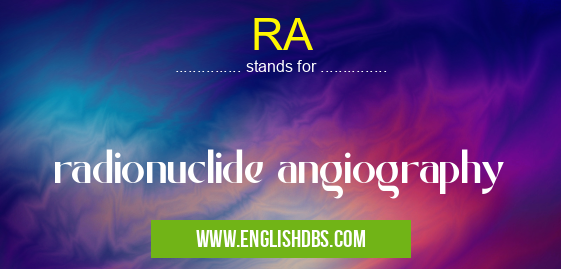What does RA mean in BRITISH MEDICINE
Radionuclide angiography (RA) is a medical imaging technique for viewing and studying the structure of blood vessels. Its main purpose is to diagnose diseases of the heart and its circulatory system, including coronary artery disease, congenital heart defects, and some tumors. RA uses radioactive substances to create images of the body's blood vessels.

RA meaning in British Medicine in Medical
RA mostly used in an acronym British Medicine in Category Medical that means radionuclide angiography
Shorthand: RA,
Full Form: radionuclide angiography
For more information of "radionuclide angiography", see the section below.
Essential Questions and Answers on radionuclide angiography in "MEDICAL»BRITMEDICAL"
How does radionuclide angiography work?
Radionuclide angiography works by injecting a small amount of radioactive material into the patient's bloodstream. This material travels through the bloodstream and accumulates around areas affected by certain diseases or blockages in the veins or arteries. Using specialized cameras, doctors can then view these areas with greater detail and clarity than they would be able to using regular X-rays or ultrasound scans.
What conditions can be diagnosed using radionuclide angiography?
Radionuclide angiography is primarily used to diagnose certain types of cardiovascular diseases, such as coronary artery disease, congestive heart failure, pulmonary embolism, and cardiomyopathy. It can also be used to detect some types of tumors that may have grown in or near the heart. Additionally, it can help assess the shape and size of organs and measure any abnormal flow within arteries or veins in order to reveal possible blockages.
What are the risks associated with radionuclide angiography?
The most common side effects associated with radionuclide angiography are nausea, vomiting, headache, dizziness and fatigue. Additionally, since radiation is being injected into the body there is always a risk of developing cancer later on in life from this procedure. However, these risks are very rare and are usually outweighed by the benefits that come from diagnosing certain cardiovascular disorders.
How should I prepare for a radionuclide angiography?
Before undergoing an RA procedure you should tell your doctor all medications you are taking as well as any allergies you may have to substances such as latex or iodine contrast dye. You may also need to stop taking certain medications prior to your procedure like diuretics; your doctor will determine if this is necessary before scheduling your RA appointment. Additionally it's important not to eat anything 4 hours prior to your appointment and you should wear comfy clothing for easy access for injections/IV lines if needed during your procedure.
Is there any special care after a radionuclide angiography?
After undergoing an RA procedure it's important that patients take it easy for at least 24-48 hours following their appointment in order for their bodies enough time rest up from having been exposed radiation exposure during the scan itself. Avoid strenuous activities during this time period such as exercise or heavy lifting; doctors often recommend mild walking activity instead if desired.
RA also stands for: |
|
| All stands for RA |
